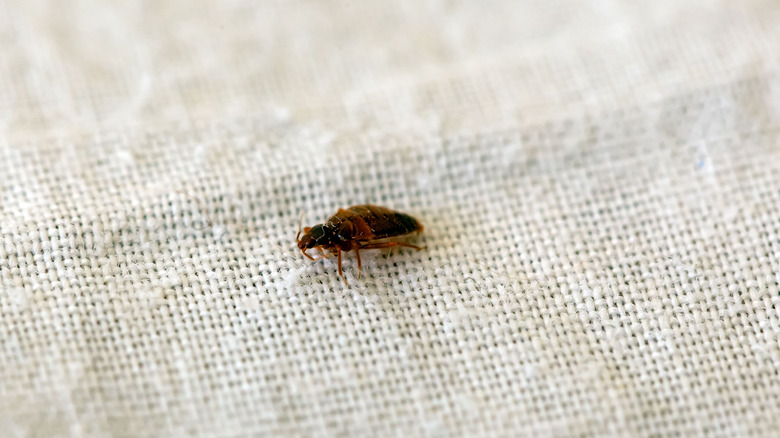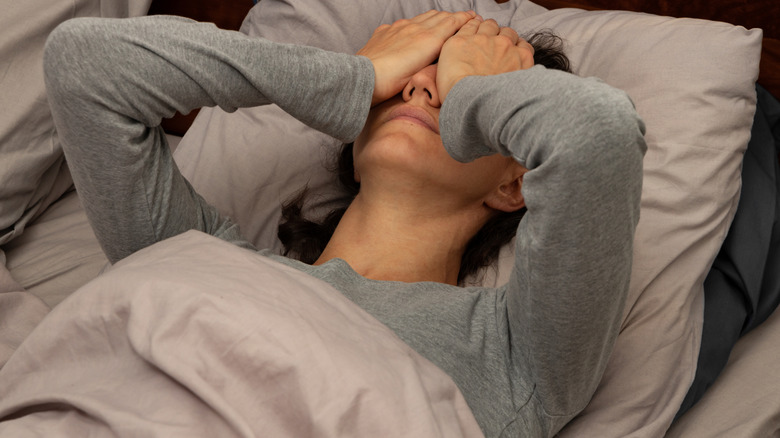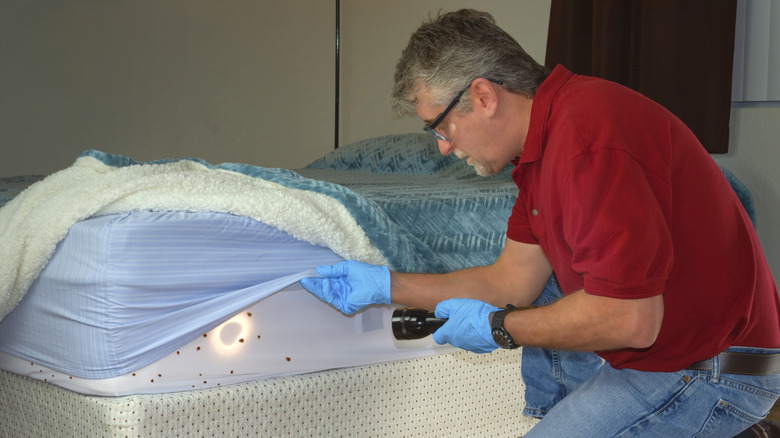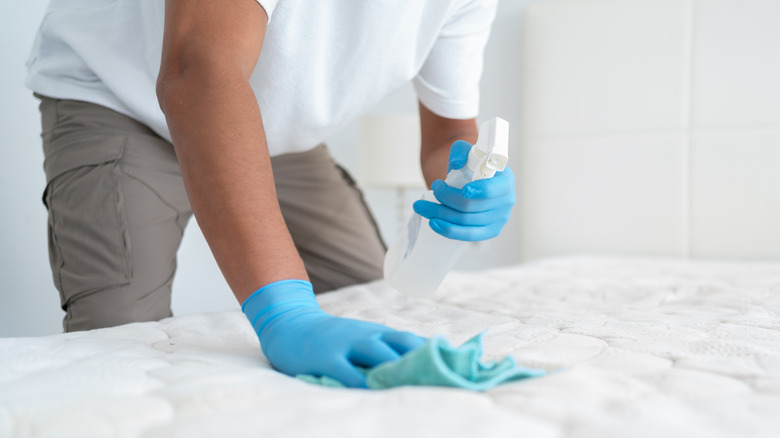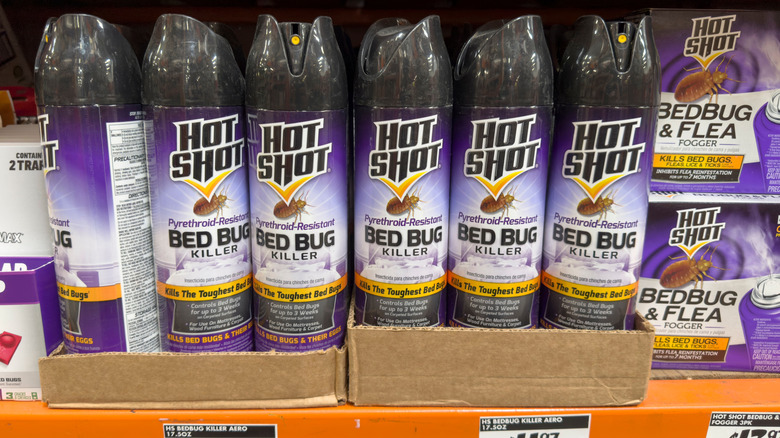Mistakes Everyone Makes When Dealing With Bed Bugs
We may receive a commission on purchases made from links.
There are some things in life that you try to ignore, be that the neighbor's barking dog or a regrettable feature in your home that is too expensive to remodel; but when it comes to the issue of bed bugs, there's no amount of ignoring you can do that will make the problem go away. Bed bugs are nasty critters that are highly effective at surviving and spreading their populations wherever they get the opportunity. They can hitch a ride on common traveling surfaces, like your clothing, backpack, or suitcase. Once you've brought a bed bug into your house, it's only a matter of time before they'll begin making themselves at home and causing a nightmare in your life. While bed bugs are not known to cause disease, no one wants an infestation in their home.
Getting rid of bed bugs permanently can be a tricky ordeal, and as such, you need to ensure that you are taking the right approach to getting them out of your home. Potential mistakes at the outset of an infestation can result in a lengthier process. There are many errors you could make when addressing bed bugs, including postponing treatment, trying to handle the infestation on your own, using the wrong treatments on your mattress and bedding, trying substances that don't work, and throwing out your mattress. Instead of making these mistakes, it's important to be informed when going to battle against bed bugs, which will give you the greatest chance of success.
Waiting too long before you start treating
No one wants to admit that their home has bed bugs, but the reality is that the longer you wait to address the issue, the worse the infestation could get. Bed bugs can spread quickly from one room — such as your bedroom — to another. As they begin to settle into a larger portion of your space, you'll be faced with higher costs from having to more heavily treat all the areas in your home. In fact, in a matter of a few months, you could have a full-house infestation on your hands. Rather than waiting, if you suspect that you have bed bugs, contact a professional pest control company right away.
Signs that you have bed bugs in your home include seeing the bugs themselves, though this can be tricky, given that they usually come out at night when your body is asleep and releasing high amounts of carbon dioxide. You may also find reddish stains on your bedding, wake up with bed bug bites, or see small dark spots on your mattress. If you have recently traveled and notice any of these signs in the days and weeks following, it's in your best interest to reach out to a reputable pest control company specializing in bed bugs right away.
Not hiring professionals
Hiring a professional team to treat the bed bugs in your home can be expensive, so it makes sense that you might want to try to manage an infestation on your own. This, however, can be a huge mistake. No matter how deep of a cleaner you are, bed bugs are notoriously difficult to deal with once they have taken hold. Heat, cold, and steam treatments are all recommended approaches to managing a bed bug infestation, but each of them can provide you with a false sense of security or even make the problem worse if you don't know what you're doing.
While some infestations can be handled on your own with the right knowledge and equipment, wiping out a population of bed bugs often will require a team of experts. It's likely that you'll have a number of visits from your selected pest control company and that they will turn your home upside down as they go room to room and look for signs of bed bugs, treating furniture as they go. For the best results, you might want to check if your pest management company is utilizing IPM (integrated pest management), which is considered to be the gold standard in low-risk, highly effective pest management. Instead of immediately reaching for hard-hitting pesticides that might be dangerous to your family or the environment, IPM gets to the root cause of the bed bugs and offers effective results – even if that means using pesticides sparingly.
Using the wrong materials to get rid of the bugs
If you search online for DIY treatments against bed bugs, you might see recommendations to use substances like gasoline, kerosene, or rubbing alcohol to eliminate bed bugs. While rubbing alcohol can kill bed bugs, it is also highly flammable and can result in much bigger problems if you're dousing your bedding in this liquid. Similarly, substances like gasoline and kerosene are flammable and not effective in attacking bed bugs. These products should never be relied upon as a suitable treatment, since they can endanger your home and your family. Other ineffective methods of handling bed bugs include sticky traps, natural products and detergents marketed as bed bug eliminators, foggers, ultrasonic pest repellers, and pyrethroid sprays.
Unfortunately, there are really only a handful of effective ways to attack a population of bed bugs in your home, including using mattress encasements, heat chambers, properly steaming furniture, vacuuming regularly, washing and drying affected items on high heat, or freezing items that are small enough to fit in the freezer. Remember to always use a reputable guide if finding your information online and avoid trying tricks to get rid of bed bugs that don't work. Universities and scientific journals are often a treasure trove in terms of outlining effective methods for handling pests such as bed bugs, thanks to their robust research departments and the presence of entomologists (that's the fancy word for bug experts).
Treating mattresses and bedding incorrectly
While it might be tempting to try to treat your actual bedding with pesticides, this is an approach that should be avoided. Using the wrong pesticide on your mattress (such as an outdoor formula indoors) can prove dangerous. Similarly, using formulas that are not EPA-registered can be a big no-no. Only EPA-reviewed products have been rigorously tested to ensure effectiveness and safety. Additionally, using pesticides on their own to try to get rid of bed bugs isn't likely going to make a dent in the infestation.
Instead, you'll need to employ the right strategy to get your mattress and bedding properly sanitized. Proper use of steam alongside diatomaceous earth or other effective desiccants should effectively kill bed bugs that are hiding in your mattress. To handle the presence of bed bugs in your removable bedding, you'll need to launder all washable sheets on a high heat of at least 140 degrees Fahrenheit for a minimum of 90 minutes, followed by a stint in a hot dryer for at least 30 minutes.
Throwing out your mattress
Bed bugs are truly disgusting parasites; if you've discovered bed bugs in your mattress you might feel like you need to throw it away and buy a new one. This, however, is an expensive blunder that doesn't always prove effective. For starters, bed bugs do not need your mattress to survive — if even one single bed bug has spread to your curtains, carpets, or another piece of furniture, you'll be tossing your mattress in vain, and bed bugs will quickly infest the new sleep surface. Instead, keep your mattress (assuming it is in good enough condition that you weren't already budgeting for a new one), then go about exterminating the bugs. With the right degree of attention — such as a proper heat treatment — your mattress should be able to be rid of all traces of bed bugs.
If you don't already own a mattress encasement, now is the ideal time to purchase one, as it can help to protect your mattress' integrity from future infestations. Be careful to not confuse a mattress protector with an encasement: the former slips over the top of the mattress, whereas the latter will cover every surface of the mattress to provide complete protection. You can find affordable encasements online, such as the Linenspa Zippered Mattress Encasement.
While bed bugs are gross and certainly a hassle to deal with, an infestation is not the end of the world. Arming yourself with the right information and approach will mean regaining control of your home so you can rest easy.
